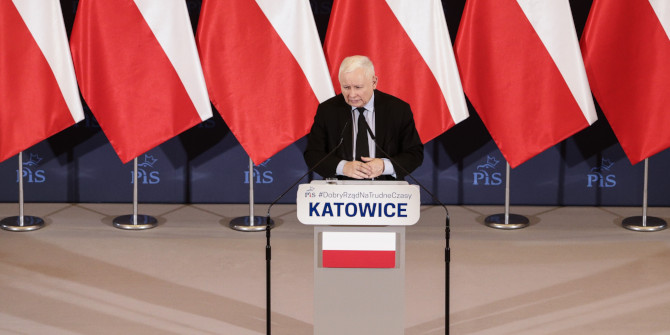The Eurozone’s system of governance is often accused of lacking democratic legitimacy. Andrei Guter-Sandu and Steffen Murau write on the role of ‘off-balance-sheet fiscal agencies’, such as the European Investment Bank, European Stability Mechanism and Single Resolution Fund. They argue that the use of these institutions and mechanisms effectively constitutes a ‘fiscal ecosystem by stealth’ and that if this system were to be put under the control of the European Parliament, it could offer a channel for enhancing legitimacy.
This year has brought about fundamental changes of governance in the Eurozone. On 5 May, the German Constitutional Court ruled against the ECB’s Public Sector Purchase Programme (PSPP) – its flagship post-crisis asset purchasing programme – by arguing that the central bank may have contravened its mandate by failing to provide a ‘proportionality’ analysis when assessing the unintended impact of its policies on the wider economy.
Fast forward a month and the ECB announced it would expand its Pandemic Emergency Purchase Programme (PEPP) by a further €600bn, effectively bringing its asset portfolio to a grand total of more than €4tn, which amounts to about a third of Eurozone GDP. In late July, EU leaders agreed after a marathon summit to expand the borrowing capacities of the European Commission to issue €750bn of debt, which will be used to dish out grants and loans to pandemic-stricken EU member states.
With these changes, the current macro-financial landscape of the Eurozone would now be unrecognisable to a visitor from the early 2000s. Asset purchasing programmes, for instance, have radically upended the relationship between central banks and not just financial market actors but also other economic agents, with the former supporting corporations either indirectly through the purchase of corporate bonds on secondary markets or directly by buying commercial paper from firms.
Inextricably linked to begin with, the boundary between monetary and fiscal policy has been further blurred. For the group of complainants that brought the case to the German Constitutional Court, this constitutes a gross violation of central banks’ mandates, whose actions should be scaled back to something resembling socio-economically neutral monetary policy. For others, though, this goes to the heart of the relationship between one of the most powerful contemporary economic actors – central banks – and democracy.
Democratising central banking?
Amid growing awareness of the extraordinary power that central banks have been accumulating in recent decades, there have been increasing calls to transform the raison d’être and scope of central banks like the ECB by opening them up to democratic deliberation, fully abandoning all limits to the size of their balance sheet and making them agents of social and environmental change. Some have argued for central banks to help finance a green transition; others to aid in overcoming the socio-economic calamity wrought by the Covid-19 pandemic; or to centralise investment planning so that central banks absorb key components of the financial system and reorient them from private profit to public purpose.

ECB President Christine Lagarde during the ECB Forum on Central Banking on 11-12 November 2020, Credit: © Bernd Hartung / European Central Bank
However, attempts to overcome the Eurozone’s democratic deficit by readjusting the governance and purpose of central banking may at the same time be problematic, for they could lead to an exorbitant accumulation of political power in a seat that has few checks and balances. When commentators decry the worldwide rise of populism and authoritarianism, they normally point to instances of attacks on the rule of law, crushing of dissent, or cutbacks in civil liberties for minority groups. But the possibility that less progressively inclined but democratically elected leaders might employ its firepower for nefarious, clientelistic, or self-serving purposes is equally worrying. Against the backdrop of new macro-financial realities, central bank independence is an important element of the separation of powers, particularly in times of growing populism.
Governing through off-balance sheet fiscal agencies
Alongside the notable transformation in central banking, there has also been a sea change in the fiscal segment of the Eurozone’s architecture. In between the EU’s multilevel governance structures, some spaces for creative institution building have emerged. This applies in particular to what we would like to call ‘off-balance-sheet fiscal agencies’ (OBFAs). Much like shadow banking entities, OBFAs make use of ‘grey areas’ in the Eurozone’s regulatory framework. Yet they offer policy space for activities that treasury balance sheets in the Eurozone do not normally have.
National treasuries are bound by tight fiscal rules, for example through the Stability and Growth Pact, the Fiscal Compact, and the European Semester. The EU ‘treasury’, despite the latest innovations via the EU Council’s compromise, is dependent ex ante on household planning through the Multiannual Financial Framework and has no autonomous rights to raise taxes or issue bonds to a large extent. In this context of fiscal discipline, national and supranational OBFAs support the functions of treasuries in three different respects.
First, OBFAs increase the scope for public investment. It has been noted that the Eurozone suffers from underinvestment, both in surplus and deficit countries. Decades of suppressing fiscal capacity and austerity have indeed decreased public investments financed through treasury balance sheets to a significantly low level. Still, we have seen an expansion of fiscal space on OBFAs through the revival of state banks and state development banks such as the German Kreditanstalt für Wiederaufbau and the French Agence Française de Développement, or – on a European level – the European Investment Bank, the European Investment Fund and the European Bank for Reconstruction and Development. These organisations have been pivotal to building a so-called “hidden investment state” at the heart of the EU and can be central to reconciling public purpose with an economic logic.
Second, OBFAs can be used to expand the stock of safe assets. The most common safe assets are treasury bonds. Holding them allows all other balance sheets to ‘store wealth’ even in times of crisis, i.e. maintain a level of balance sheet expansion over time. From this point of view, treasury bonds are themselves a public good that is in high demand and constant undersupply – in fact, the more the credit system expands to support a growing economy, the greater the shortage of safe assets becomes.
Government Sponsored Enterprises such as Fannie Mae and Freddie Mac are OBFAs that support the treasury in supplying safe asset in the United States. In the Eurozone, the main safe asset is provided by the German treasury. This is a suboptimal situation which comes along with a constant shortage of safe assets and necessitates top-ups with US safe assets to satisfy growing demand. To create genuine European safe assets, the European Commission proposed the development of a European supranational OBFA that would supply ‘Sovereign Bond-Backed Securities’. This is one of the latest ideas to improve Eurozone governance.
Third, OBFAs support treasuries in acting as capital insurers of last resort. In a crisis – the sudden contraction of non-fiscal balance sheets, for example of banks and households – treasuries stand ready to bail out other institutions by passing on assets to them, either in the form of a loan or a permanent transfer. This function is often connected to a logic of insurance against symmetric or asymmetric shocks, which makes this function a matter of ‘monetary solidarity’. Treasuries performed that function when they ‘bailed out’ banks in the 2009-12 Eurozone crisis or when they provided emergency loans to European firms and households during the Covid-19 crisis in 2020.
Some OBFAs support the treasury in exercising that function by pooling resources of a broader member base in order to then lend them back to some of its members in need. In the EU, these are primarily the European Stability Mechanism as well as its non-permanent predecessors, the European Financial Stability Facility and the European Financial Stability Mechanism (EFSM), but also the Single Resolution Fund. As a counter-factual institution, there are also proposals for a European Monetary Fund with increased firepower. To some extent, these mechanisms provide de facto workarounds to the non-bailout clause, a Treaty-level norm.
Democratising (through) off-balance sheet fiscal agencies
The proliferation of Eurozone OBFAs can increase the scope for public investment and expand the stock of safe assets to support a growing economy, all the while providing insurance mechanisms that shelter the economy in case of distress. This mode of “governing through OBFAs”, while being a creative and pragmatic form of technocratic bricolage, reinforces the age-old problem purportedly afflicting the EU: its democratic deficit.
The EU has always had to juggle problems with its “input legitimacy” while compensating for this with its problem-solving competence, or “output legitimacy”. To do so, it has built a web of bureaucracy and an arcane institutional structure that allows it to improve the capacity of governance at the EU level so that it can deliver policies in the name and for the benefit of EU citizens in a highly power-dispersed system, and thus increase output legitimacy. The proliferation of OBFAs, as a technocracy-driven process, ties into this trend.
To close this democratic gap, we propose to place the supranational OBFAs under the authority of the European Parliament. The 2019 European elections and the farce of abruptly jettisoning the Spitzenkandidat principle struck a profound blow against attempts to increase the European Parliament’s relevance. Receiving budget authority over OBFAs would be an effective channel for instilling it with a new sense of purpose.
As OBFAs are mission- rather than profit-driven agencies, their governance can be integrated into the deliberative cycles of the European Parliament. Some of these OBFAs, furthermore, have the potential to improve input legitimacy not only through representative avenues, but also through direct forms of participation. For example, many public investment banks are highly localised and narrowly focused organisations, which means there is scope for participatory forms of governance at the local level in which unions, local SMEs, and civil society actors can contribute to carving the public objectives of OBFAs alongside management and technocrats.
Democratising Eurozone governance by involving the European Parliament in the management of OBFAs may offer an alternative avenue towards what is often called ‘fiscal union’. The traditional, quasi-teleological reasoning assumes that there can only be fiscal union if national Eurozone treasuries give up some of their competences and subordinate them under an EU treasury with far-reaching taxation and bond-issuing powers.
The proliferation of OBFAs, by contrast, shows that the Eurozone in fact already has a ‘fiscal ecosystem’ by stealth, in which these competences are spread across a wide array of different national and supranational balance sheets over which different actors have a say. This is the reality we live in. Our suggestion is that this fiscal ecosystem can be a channel for both augmenting European wellbeing and enhancing its democratic capabilities by putting genuinely European balance sheets under the control of the European Parliament and hence EU citizens.
The future of Eurozone governance
Monetary policy is not an obvious instrument for tackling grand challenges. It would be better if central banks remain enablers of financial stability and lenders of last resort for emergency liquidity rather than front row agents of policy change. They may contribute to fiscal stimulus by keeping long-term borrowing cheap, while letting democratically controlled off-balance sheet fiscal agencies pursue their targeted missions. Using democratised OBFAs for financing direly needed investment in the European political economy is a more promising avenue for increasing input legitimacy at the European level and thus harmonising democracy and economy across the EU.
The authors were recently awarded a prize for this research as part of the Hertie Foundation’s essay competition on capitalism and democracy. A German version of this article has been published in the business weekly WirtschaftsWoche.
Note: This article gives the views of the authors, not the position of EUROPP – European Politics and Policy or the London School of Economics. Featured image credit: © Bernd Hartung / European Central Bank




